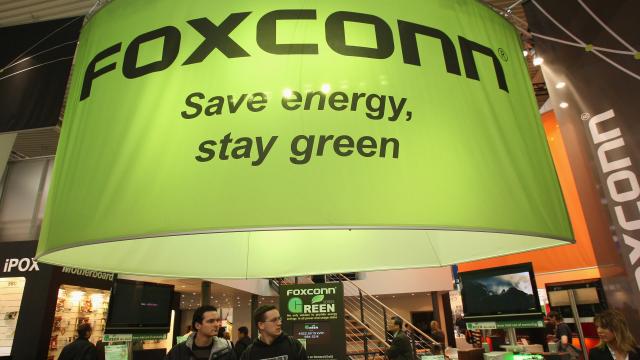This week, the Wisconsin Department of Natural Resources gave the go-ahead to Taiwanese tech manufacturer Foxconn to siphon off 26.5ML of water per day from Lake Michigan, despite protests from conservation groups.
Photo: Getty
The massive diversion of water from the lake will be used to produce LCD screens at the company’s planned $US10 ($13) billion, 20 million square foot manufacturing plant set to be built in Mount Pleasant, Wisconsin.
Nearly 10.2ML of the water — about 39 per cent of the daily intake from the factory — will be lost in the process, primarily from evaporation. The remaining water will be treated and returned to the lake basin.
Wisconsin’s DNR noted in a statement that the requested withdrawal will “only amount to a 0.07 per cent increase in the total surface water withdrawals from Lake Michigan.” For environmentalists in the region, the issue is not so much the diversion for the Foxconn factory itself but rather the precedent it will set for how the lake water can be used.
“If we allow this to happen, it’s going to happen all over the basin, with other states and then it’s going to be the thirsty states and nations to come,” Jennifer Giegerich, the government affairs director for the Wisconsin League of Conservation Voters, warned during a public hearing about the diversion, according to the Wisconsin Gazette.
Lake Michigan is part of the Great Lakes, which contain about one-fifth of the world’s fresh surface water. Historically, that water is intended to be used for public purposes such as drinking water and water utilities.
The valuable resource is protected by the Great Lakes Compact, an agreement made in 2008 that was intended to preserve the Great Lakes basin. The agreement states, “In general, there is a ban on new diversions of water from the Basin but limited exceptions could be allowed in communities near the Basin when rigorous standards are met.”
To make such an exception, it is typically required to get permission from all eight governors of the states surrounding the Great Lakes.
In the case of the Foxconn factory, no such permission was obtained thanks to some finessing of the rules. The Foxconn factory is located in Mount Pleasant, a small village outside of the Great Lakes basin. Straddling communities are required to meet stricter requirements in order to access the lake water, so the application for the diversion was made by Racine, a city within the basin.
The request from Racine was allowed because water utility serves a small percentage of residents in Mount Pleasant. That allowed the DNR to say the diversion qualified as being used for “public water supply purposes” and would not require the type of stringent review applied to other cases. The DNR did acknowledge that the diversion would “partially” include the Foxconn facility.
Kerry Schumann, the executive director of the Wisconsin League of Conservation Voters, described the diversion plan as “a thinly veiled attempt to degrade the Great Lakes Compact, one of the finest conservation achievements in a generation.”
The Compact Implementation Coalition, an organisation dedicated to ensuring the Great Lakes Compact is followed, expressed dismay over the DNR’s decision. “The CIC feels it is unfortunate that DNR is ignoring not only the spirit, intent and plain language of the Great Lakes Compact, but also the voiced concerns of thousands of Wisconsin citizens,” the group said in a statement.
Conservation groups are planning to challenge the DNR’s decision and attempt to hold accountable the government and Foxconn, but they have their work cut out for them. Prior to the water diversion, the DNR also granted Foxconn permits that will allow the company to pump harmful pollutants into the air.
Ground has not yet broken on the planned Foxconn factory site, though the company just took possession of the land where it will be located. Scott Walker, the Republican governor who landed the factory by handing the Taiwanese manufacturer $US3 ($4) billion in tax credits, is up for re-election later this year.
Voting him out of office would be the most prudent path for those interested in protecting the state’s environment.
[Motherboard, Wisconsin Journal Sentinel, Wisconsin Gazette, Chicago Tribune]
